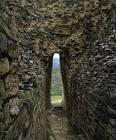
The Jews were the chosen people and because of this some of them felt sure of salvation. The Pharisee in the parable felt so pleased with himself that his prayer consisted of giving God a list of his good deeds. He despised the publican who was praying far off, begging for forgiveness (Luke 18:9-18). Jesus was reminding people that nobody has the entitlement imagined by the Pharisee (Luke 18:9-14). His image of the narrow door suggests effort. Going through it is not just a matter of ticking boxes.
Throughout history there have been those who considered themselves as among the elect. The trouble is that people persist in their conviction that God thinks and acts in human ways. The parable of the labourers should convince them otherwise. Those who came to work in the vineyard at the eleventh hour were given the same payment as those who had worked all day (Matt. 20:1-16).
Isaiah foresaw a time when people from every nation would worship God and Jesus confirms this vision. In Acts 10:34-36, Peter said: “I truly believe that God shows no partiality but in every nation anyone who fears him and does what is right is acceptable to him.”
Those who go through the narrow door encounter Christ in a loving relationship wherever they meet him.
Create in me a clean heart, O God, and renew a right spirit within me.
(Psalm 51:12)